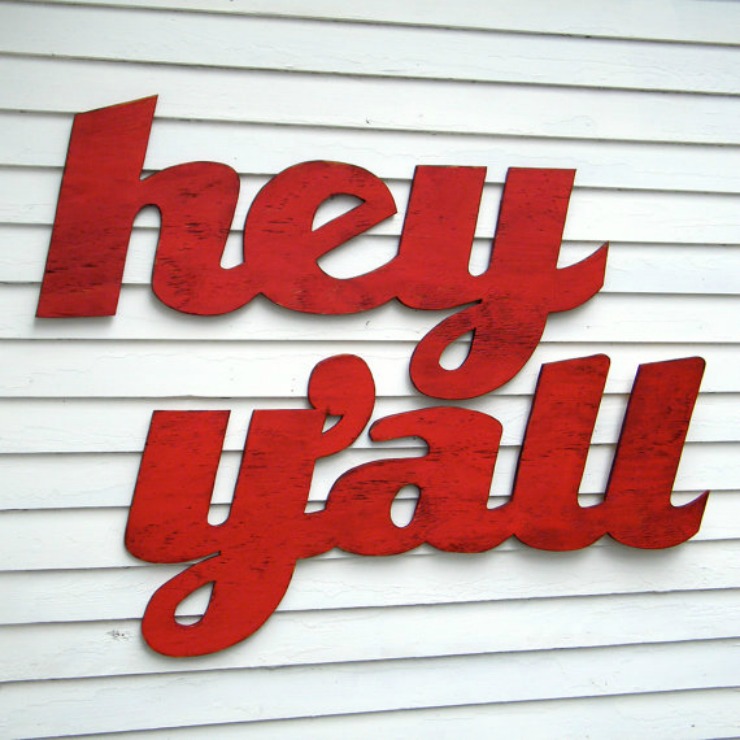I’m not a native of the South. I grew up in the Pacific Northwest, went to graduate school throughout the Midwest, and wound up in Texas as the result of my job. Mike and I never thought we’d make our home here: we came to Texas thinking we’d stay just as long as it took us to find jobs elsewhere. We were definitely not Texans. Even more certainly, we were not Southerners.
Fast forward roughly 20 years. Yep, we’re still here.
The forces that have kept us in Texas are many and various, but among them have been the demands of a two-career marriage, the needs of growing children developing a friend network–and, it must be said, a certain Southern charm that grew on me. I got used to being asked “Sweet or unsweet?” when I ordered a glass of iced tea. (When family visited from another part of the country, I made sure to prepare them for that question.) I discovered the glory of shrimp and grits. I taught my children to say “Yes ma’am” and “Yes sir” to the various adults in their lives. To be honest, it seemed unnecessary and archaic to me, but it clearly mattered to many people. Not doing so suggested something that just wasn’t true about my kids. (Also? It turns out that I kind of like it when my students answer my questions with “Yes ma’am.”)
Most surprisingly, though, I made my peace with y’all.
My initial encounter with the word–the first one I remember, anyway–happened with my daughter’s first grade teacher. I was visiting the classroom for a reading project when the teacher stood up, clapped her hands, and started dividing the children into groups.
“All right now,” she said, pointing to one row of kids. “Y’all four get together in a group. Y’all guys”–she pointed to another row–“can be a group. And all y’all–” she waved her hands toward the remaining kids–“you come with me.”
Those struck me as the most hilarious sentences I’d ever heard. But when I mentioned them to a group of my students sometime later that day, they didn’t find this funny at all.
“What’s wrong with y’all?” one of my students asked. “It’s functional. You know what it means. People say all of you guys and it’s no big deal. Why is y’all guys any different?”
It was clear I’d stepped on some toes, so I tried to backpeddle and explain that I found it amusing because it was unfamiliar to me–I don’t think I’d ever heard an actual person (someone not playing the stereotype of a Southerner in a movie) use the word y’all unironically. I’d certainly never heard someone use the word in so many different ways.
Even now, this deep into my Texas odyssey, it’s not easy for me to use y’all in everyday speech. I feel a little affected when I do it, like I’m trying too hard to be folksy. Then again, it’s been pointed out to me that I use the word without even thinking about it. One night, I’m told, I called my stubborn kids to the dinner table by saying “Y’all guys get in here right now!”
As Vann R. Newkirk II points out in America Needs Y’all, the word serves a very specific function. Contemporary English has “no distinct second-person pronouns”; the closest we get is you, that catchall word that can mean both you individually and “all of you”–whatever nebulous group that happens to be. You quickly become confusing; it can be unclear whether we’re referring to one person or the group as a whole when we address both parties using the same pronoun.
Every time I teach Introduction to Women’s Studies, we talk about the fact that walking into a room and calling out “Hi guys!” is understood to mean everyone in the room. “Hi gals!” is a greeting directed only toward the women–it’s understood as an attempt to separate them out from the men. Why can’t the feminine pronoun be universalized? My students never miss a beat before answering that question: “Because calling a guy a girl is an insult.” That, too, is evidence of our need for gender-neutral second-person plural pronoun (in addition to being evidence of the androcentric nature of English—but that’s a topic for another day.)
Y’all neatly takes care of the problem of addressing an entire group of people. Y’all means all. In its more formal construction, y’all simply means all of you. Newkirk notes that there’s some speculation about the word’s origin, but I’m not sure it matters where the word came from–the point is that we understand what it means when it’s used in a sentence. As I’ve already noted, that’s not always the case with you. Even in the teacher’s example above, I knew exactly what she was saying: all four of you and all the rest of you. I’d just never heard it said that way.
There is, of course, a bias against y’all. I was guilty of it myself. Most likely, Newkirk suggests, that bias stems from the fact that Southern accents are often treated as the marker of an uneducated speaker; in movies, the designated Country Bumpkin often speaks with a Southern drawl. But while I understand that y’all belongs in casual conversation, along with other contractions we use regularly–don’t, won’t, could’ve, etc.–I can’t see any other reason to avoid using it. If someone is going to view me as uneducated for that reason alone, their leap to an unfounded conclusion is their mistake, not mine. Y’all is as grammatically correct as any other contraction.
One request, though: if you’re going to use it in writing, spell it correctly. It’s y’all, not ya’ll. Maybe the mark of my newfound inner Southerner is the fact that it drives me crazy to see y’all misspelled.
But whether you grew up in the South or not, y’all feel free to make yourselves clear the next time you need to speak to a large group of people–without erasing anybody in the process.





2 Comments
Love this. Thanks for sharing.
i’ve used ya’ll my whole life, except for a brief stint in new york (only because i quickly learned that it drew weird looks and i felt self-conscious…pretty soon, i stopped caring and resumed saying it!). it makes perfect sense to me, especially compared to some of the other phrases i hear around these parts! 🙂